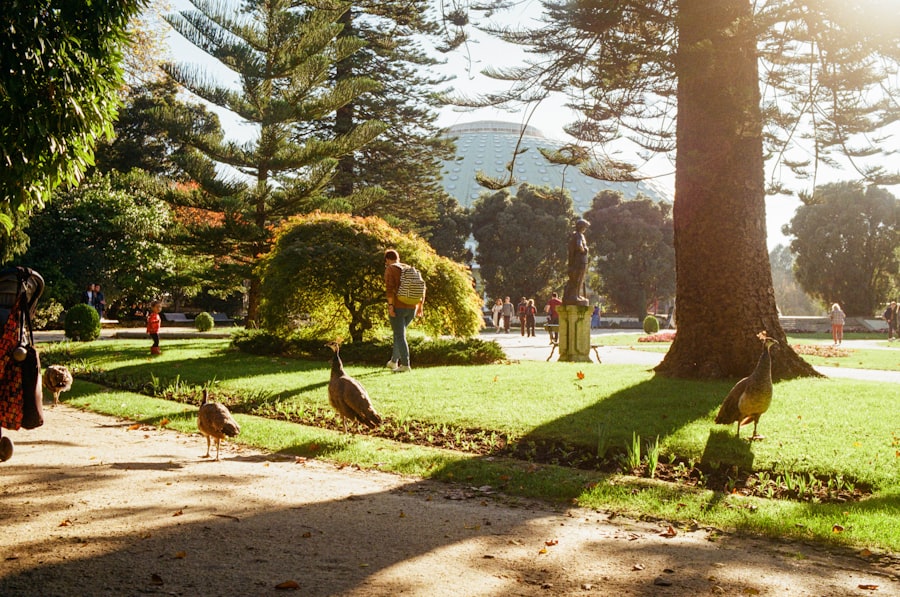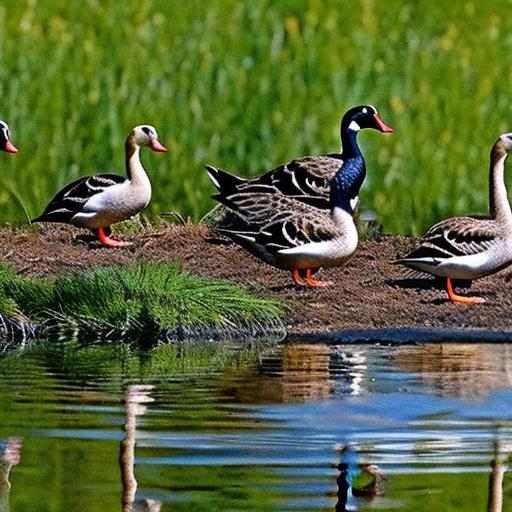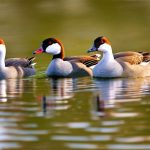Geese invading yards and neighborhoods can be a frustrating problem for many homeowners. These large birds can cause damage to lawns, leave behind droppings that are unsightly and unsanitary, and even become aggressive towards humans and pets. Fortunately, there are several methods that can be used to keep geese away and prevent them from causing further problems.
One of the first steps in addressing the issue of geese invading yards is to understand their behavior. Geese are attracted to areas that provide them with food, water, and shelter. By understanding what attracts geese to certain areas, homeowners can take steps to make their yards less appealing and discourage geese from settling in.
Key Takeaways
- Understanding geese behavior is crucial in keeping them out of your yard.
- Physical barriers like fencing and netting can effectively deter geese.
- Creating a hostile environment with sound and light can also discourage geese from staying in your yard.
- Natural repellents like certain plants and scents can be used to keep geese away.
- Scare tactics such as decoys and moving objects can be effective in scaring geese away.
Understanding the Behavior of Geese: The First Step to Keeping Them Out of Your Yard
Geese are social animals that typically travel in flocks. They are attracted to areas that provide them with a reliable food source, such as grassy lawns or agricultural fields. Geese also require access to water for drinking and bathing, so they are often found near bodies of water such as ponds or lakes. Additionally, geese prefer areas that offer shelter from predators, such as tall grass or shrubs.
Understanding these behaviors can help homeowners in keeping geese away. By removing or limiting access to these attractants, homeowners can make their yards less appealing to geese. For example, keeping grass short and well-maintained can discourage geese from grazing on lawns. Installing fences or netting around ponds or other bodies of water can prevent geese from accessing these areas.
Physical Barriers: Fencing and Netting to Keep Geese Away
Physical barriers such as fences and netting can be effective in keeping geese out of yards and neighborhoods. Fences should be at least three feet high and have small openings to prevent geese from squeezing through. Netting can be used to cover ponds or other bodies of water to prevent geese from accessing them.
There are different types of fences and netting that can be used to keep geese away. For example, electric fences can be effective in deterring geese, as they deliver a mild electric shock when touched. This can be a humane way to keep geese away without causing them harm. Netting can be made from materials such as nylon or polypropylene and should be securely fastened to prevent geese from getting underneath.
Creating a Hostile Environment: Using Sound and Light to Deter Geese
Creating a hostile environment for geese can also help in keeping them away. Geese are sensitive to loud noises and bright lights, so using sound and light devices can be an effective deterrent. For example, using devices that emit loud noises such as sirens or fireworks can startle geese and encourage them to leave the area.
There are different types of sound and light devices that can be used to deter geese. Some devices emit distress calls of geese or other bird species, which can signal danger and cause geese to flee. Others use bright flashing lights or lasers to create a visual deterrent. These devices should be strategically placed in areas where geese are known to congregate, such as near ponds or feeding areas.
Natural Repellents: Plants and Scents That Geese Dislike
Using natural repellents can also be an effective way to keep geese away. There are certain plants and scents that geese dislike, and incorporating these into your yard can discourage geese from settling in. For example, planting tall grasses or shrubs can provide cover for geese predators and make the area less attractive to geese.
There are different types of plants and scents that can be used as natural repellents for geese. Some plants, such as yarrow or lavender, have strong scents that geese find unpleasant. Planting these around the perimeter of your yard or near areas where geese congregate can help in keeping them away. Additionally, there are commercial repellents available that use scents such as grape extract or garlic to deter geese.
Scare Tactics: Using Decoys and Moving Objects to Scare Geese Away

Scare tactics can be an effective way to scare geese away from your yard or neighborhood. Geese are wary of predators and will avoid areas where they feel threatened. Using decoys or moving objects that resemble predators can help in keeping geese away.
There are different types of decoys and moving objects that can be used to scare geese away. Decoys such as plastic owls or coyotes can be placed in areas where geese congregate to create the illusion of a predator. These decoys should be moved periodically to prevent geese from becoming accustomed to them. Additionally, using moving objects such as windsocks or flags can create movement and noise that will deter geese.
Water Management: How to Control the Water Sources to Keep Geese Away
Water management is an important aspect of keeping geese away. Geese require access to water for drinking and bathing, so controlling water sources can help in discouraging them from settling in your yard or neighborhood. For example, installing sprinklers near ponds or other bodies of water can disrupt geese and make the area less appealing.
There are different methods that can be used to control water sources and keep geese away. Installing motion-activated sprinklers can startle geese and encourage them to leave the area. Additionally, using floating devices such as buoys or inflatable alligators in ponds can create movement and deter geese from accessing the water.
Pet Protection: Keeping Your Pets Safe from Aggressive Geese
Keeping pets safe from aggressive geese is a priority for many homeowners. Geese can become territorial and aggressive, especially during nesting season. It is important to take steps to protect your pets from potential harm.
There are different methods that can be used to protect pets from aggressive geese. Keeping pets on a leash when outside can prevent them from approaching geese and provoking a response. Additionally, creating a physical barrier such as a fence or netting can prevent geese from entering areas where pets are present. It is also important to supervise pets when they are outside and intervene if they come into contact with geese.
Lawn Maintenance: How to Keep Your Lawn Unattractive to Geese
Maintaining your lawn properly can help in keeping geese away. Geese are attracted to well-manicured lawns that provide them with a reliable food source. By taking steps to make your lawn less attractive, you can discourage geese from settling in.
There are different methods that can be used to keep lawns unattractive to geese. Keeping grass short and well-maintained can discourage geese from grazing on lawns. Additionally, removing weeds and other plants that geese find appealing can help in keeping them away. It is also important to promptly clean up any spilled birdseed or other food sources that may attract geese.
Community Efforts: Working with Neighbors to Keep Geese Out of Your Neighborhood
Addressing the issue of geese invading yards and neighborhoods often requires a community effort. Geese are mobile creatures and can easily move from one area to another. By working together with neighbors, you can increase the effectiveness of your efforts in keeping geese away.
There are different ways that neighbors can work together to keep geese out of their neighborhood. For example, coordinating lawn maintenance schedules can help in making the entire neighborhood less attractive to geese. Additionally, sharing information about effective deterrent methods and pooling resources to purchase and install deterrent devices can be beneficial. It is important to communicate and collaborate with neighbors to ensure a coordinated approach.
Seeking Professional Help: When to Call in Experts to Deal with Geese Infestations
In some cases, it may be necessary to call in experts to deal with geese infestations. If the problem persists despite your best efforts, or if the geese are causing significant damage or posing a threat to human or pet safety, it is advisable to seek professional help.
There are different types of experts that can be called in to deal with geese infestations. Wildlife control professionals have the knowledge and experience to effectively remove geese from your property and implement long-term solutions to prevent their return. Additionally, landscaping professionals can provide guidance on lawn maintenance practices that can help in keeping geese away.
Geese invading yards and neighborhoods can be a frustrating problem for homeowners. However, there are several methods that can be used to keep geese away and prevent them from causing further problems. By understanding the behavior of geese and implementing deterrent methods such as physical barriers, scare tactics, natural repellents, water management, and lawn maintenance, homeowners can effectively keep geese out of their yards and neighborhoods. Additionally, working together with neighbors and seeking professional help when necessary can increase the effectiveness of these efforts. It is important for homeowners to take action and implement these methods to keep geese away and maintain a safe and enjoyable living environment.
If you’re looking for effective ways to keep geese out of your yard, you might also be interested in learning about the importance of the size and design of your chicken coop. A well-designed coop can not only provide a safe and comfortable space for your chickens but can also help deter unwanted visitors like geese. Check out this informative article on poultrywizard.com that discusses the ideal door size for a chicken coop: https://poultrywizard.com/keeping-chickens/chicken-coop-door-size/. By implementing the right coop features, you can create a secure environment for your chickens while keeping geese at bay.
FAQs
What are some common problems caused by geese in yards?
Geese can cause damage to lawns, gardens, and landscaping. They can also leave behind large amounts of droppings, which can be unsightly and unsanitary.
What are some effective ways to keep geese out of my yard?
Some effective ways to keep geese out of your yard include using physical barriers such as fences or netting, using noise deterrents such as loud noises or motion-activated sprinklers, and using visual deterrents such as decoys or reflective tape.
Are there any humane ways to keep geese out of my yard?
Yes, there are many humane ways to keep geese out of your yard. These include using physical barriers, noise deterrents, and visual deterrents. It is important to avoid using harmful or lethal methods to control geese populations.
What should I do if I encounter a nesting goose in my yard?
If you encounter a nesting goose in your yard, it is important to give the goose plenty of space and avoid disturbing the nest. It is also important to avoid feeding or approaching the goose, as this can cause it to become aggressive.
What are some long-term solutions for keeping geese out of my yard?
Some long-term solutions for keeping geese out of your yard include planting vegetation that geese do not like, such as tall grasses or shrubs, and creating a habitat that is less attractive to geese, such as reducing the amount of open water or food sources in your yard. It is also important to be consistent with deterrent methods to discourage geese from returning to your yard.
Meet Walter, the feathered-friend fanatic of Florida! Nestled in the sunshine state, Walter struts through life with his feathered companions, clucking his way to happiness. With a coop that’s fancier than a five-star hotel, he’s the Don Juan of the chicken world. When he’s not teaching his hens to do the cha-cha, you’ll find him in a heated debate with his prized rooster, Sir Clucks-a-Lot. Walter’s poultry passion is no yolk; he’s the sunny-side-up guy you never knew you needed in your flock of friends!







